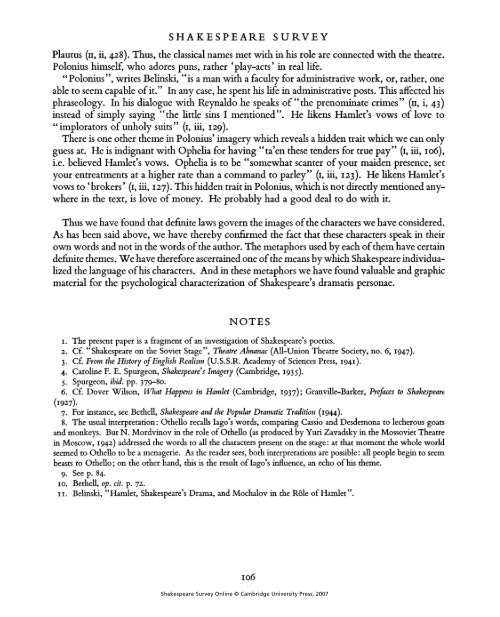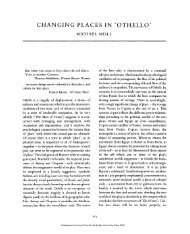the individualization of shakespeare's characters through imagery
the individualization of shakespeare's characters through imagery
the individualization of shakespeare's characters through imagery
You also want an ePaper? Increase the reach of your titles
YUMPU automatically turns print PDFs into web optimized ePapers that Google loves.
SHAKESPEARE SURVEY<br />
Plautus (n, ii, 428). Thus, <strong>the</strong> classical names met with in his role are connected with <strong>the</strong> <strong>the</strong>atre.<br />
Polonius himself, who adores puns, ra<strong>the</strong>r 'play-acts' in real life.<br />
"Polonius", writes Belinski, "is a man with a faculty for administrative work, or, ra<strong>the</strong>r, one<br />
able to seem capable <strong>of</strong> it." In any case, he spent his life in administrative posts. This affected his<br />
phraseology. In his dialogue with Reynaldo he speaks <strong>of</strong> "<strong>the</strong> prenominate crimes" (n, i, 43)<br />
instead <strong>of</strong> simply saying "<strong>the</strong> little sins I mentioned". He likens Hamlet's vows <strong>of</strong> love to<br />
"implorators <strong>of</strong> unholy suits" (1, iii, 129).<br />
There is one o<strong>the</strong>r <strong>the</strong>me in Polonius' <strong>imagery</strong> which reveals a hidden trait which we can only<br />
guess at. He is indignant with Ophelia for having "ta'en <strong>the</strong>se tenders for true pay" (1, iii, 106),<br />
i.e. believed Hamlet's vows. Ophelia is to be "somewhat scanter <strong>of</strong> your maiden presence, set<br />
your entreatments at a higher rate than a command to parley" (1, iii, 123). He likens Hamlet's<br />
vows to 'brokers' (1, iii, 127). This hidden trait in Polonius, which is not directly mentioned anywhere<br />
in <strong>the</strong> text, is love <strong>of</strong> money. He probably had a good deal to do with it.<br />
Thus we have found that definite laws govern <strong>the</strong> images <strong>of</strong> <strong>the</strong> <strong>characters</strong> we have considered.<br />
As has been said above, we have <strong>the</strong>reby confirmed <strong>the</strong> fact that <strong>the</strong>se <strong>characters</strong> speak in <strong>the</strong>ir<br />
own words and not in <strong>the</strong> words <strong>of</strong> <strong>the</strong> author. The metaphors used by each <strong>of</strong> <strong>the</strong>m have certain<br />
definite <strong>the</strong>mes. We have <strong>the</strong>refore ascertained one <strong>of</strong> <strong>the</strong> means by which Shakespeare individualized<br />
<strong>the</strong> language <strong>of</strong> his <strong>characters</strong>. And in <strong>the</strong>se metaphors we have found valuable and graphic<br />
material for <strong>the</strong> psychological characterization <strong>of</strong> Shakespeare's dramatis personae.<br />
NOTES<br />
1. The present paper is a fragment <strong>of</strong> an investigation <strong>of</strong> Shakespeare's poetics.<br />
2. Cf. "Shakespeare on <strong>the</strong> Soviet Stage", Theatre Almanac (All-Union Theatre Society, no. 6, 1947).<br />
3. Cf. From <strong>the</strong> History <strong>of</strong> English Realism (U.S.S.R. Academy <strong>of</strong> Sciences Press, 1941).<br />
4. Caroline F. E. Spurgeon, Shakespeare 9 s Imagery (Cambridge, 1935).<br />
5. Spurgeon, ibid. pp. 379-80.<br />
6. Cf. Dover Wilson, What Happens in Hamlet (Cambridge, 1937); Granville-Barker, Prefaces to Shakespeare<br />
(1927).<br />
7. For instance, see Be<strong>the</strong>ll, Shakespeare and <strong>the</strong> Popular Dramatic Tradition (1944).<br />
8. The usual interpretation: O<strong>the</strong>llo recalls Iago's words, comparing Cassio and Desdemona to lecherous goats<br />
and monkeys. But N. Mordvinov in <strong>the</strong> role <strong>of</strong> O<strong>the</strong>llo (as produced by Yuri Zavadsky in <strong>the</strong> Mossoviet Theatre<br />
in Moscow, 1942) addressed <strong>the</strong> words to all <strong>the</strong> <strong>characters</strong> present on <strong>the</strong> stage: at that moment <strong>the</strong> whole world<br />
seemed to O<strong>the</strong>llo to be a menagerie. As <strong>the</strong> reader sees, both interpretations are possible: all people begin to seem<br />
beasts to O<strong>the</strong>llo; on <strong>the</strong> o<strong>the</strong>r hand, this is <strong>the</strong> result <strong>of</strong> Iago's influence, an echo <strong>of</strong> his <strong>the</strong>me.<br />
9. See p. 84.<br />
10. Be<strong>the</strong>ll, op. cit. p. 72.<br />
11. Belinski, "Hamlet, Shakespeare's Drama, and Mochalov in <strong>the</strong> Role <strong>of</strong> Hamlet".<br />
106<br />
Shakespeare Survey Online © Cambridge University Press, 2007



